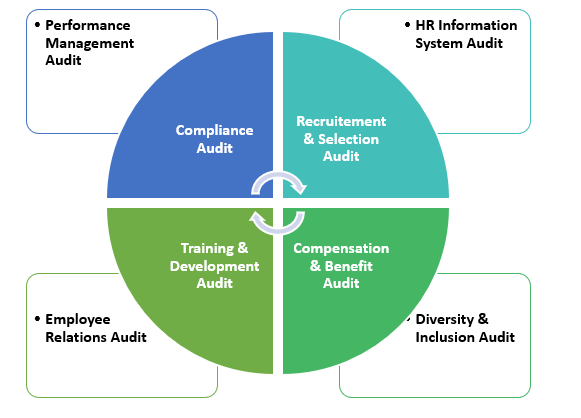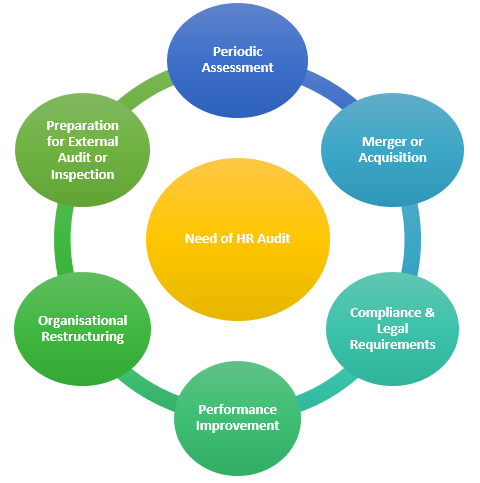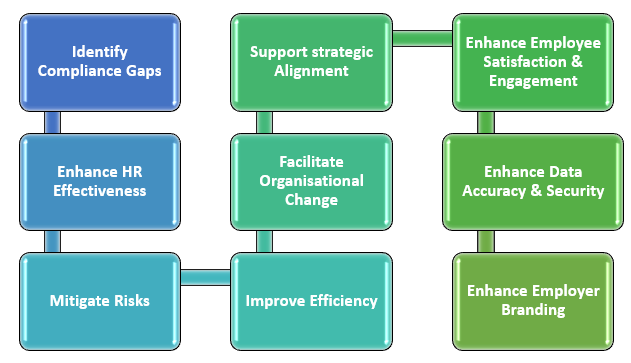HR Audit is a systematic evaluation of an organization's HR policies, practices, procedures, and systems to assess its effectiveness and efficiency. It aims to identify areas of improvement, potential risks, and compliance gaps within the HR function. By conducting an audit, organizations can ensure their HR practices align with best practices, legal standards, and industry norms. This helps identify strengths and weaknesses in HR processes, enabling informed decisions to enhance overall HR effectiveness.
Types of HR Audit
There are different types of HR audits that organizations can conduct, depending on their specific needs and focus areas. Here are some common types of HR audits:
- Compliance Audit:
Audit assesses organization's compliance with employment laws, regulations, and policies, ensuring HR practices align with legal requirements. For example, an organization may conduct a compliance audit to review its record-keeping practices, employment contracts, and adherence to equal employment opportunity laws.
- Recruitment and Selection Audit: Audit examines recruitment and selection processes for fairness, objectivity, and effectiveness in an organization. For example, an organization may conduct a recruitment and selection audit to assess whether its hiring practices align with best practices and support diversity goals.
- Compensation & benefit Audit: Audit assesses organization's compensation, benefits practices for competitiveness, fairness, and compliance. For Example, an organization may conduct a compensation and benefits audit to review its pay equity practice.
- Training & Development Audit: Audit evaluates training and development programs' effectiveness, alignment with strategic objectives, analyzing needs, delivery methods, employee skill development. For example, an organization may conduct a training and development audit to evaluate the impact of its leadership development programs and identify areas for improvement.
- Performance Management Audit: Audit evaluates organization's performance management processes, assessing effectiveness, fairness, and identifying opportunities for improvement. For example, an organization may conduct a performance management audit to review the consistency and objectivity of its performance appraisal system.
- Employee Relation Audit: Audit assesses employee relations practices, communication channels, conflict resolution, engagement, and labor law compliance. For example, an organization may conduct an employee relations audit to review its complaint resolution processes and assess employee satisfaction levels.
- HR Information System Audit: Audit evaluates HR systems, data management, security, accuracy, accessibility, confidentiality, and efficiency of HRIS processes. For example, an organization may conduct an HR information systems audit to review data privacy controls and ensure compliance with data protection regulations.

Why HR Audit is required to be conducted?
HR audits are conducted in various situations and times based on an organization's needs and objectives, including: -
-
Periodic Assessments: HR audits are crucial for organizations to ensure up-to-date practices, compliance with laws and regulations, and alignment with organizational goals during monitoring and evaluation processes.
- Merger or Acquisition:Conducting an HR audit during mergers, acquisitions, or significant changes helps assess compatibility, identify gaps, and support a smoother transition by assessing HR policies, practices, and systems.
- Compliance and Legal Requirements:HR audits ensure compliance with employment laws, regulations, and industry standards, identifying non-compliance, mitigating risks, and promoting ethical practices.
- Performance Improvement:An HR audit helps identify underlying causes of HR challenges by examining processes, procedures, and systems to identify areas for improvement in recruitment, training, employee relations, and performance management.
- Organizational Restructuring:An HR audit aligns HR functions with new organizational structures during restructuring, assessing effectiveness, identifying redundancies, and supporting streamlined processes to streamline HR processes.
- Preparation for External Audits or Inspection:HR audits are proactive measures for organizations to prepare for external audits and inspections by regulatory bodies or certification agencies, ensuring compliance with standards and preventing non-compliance penalties.

Steps of HR Audit
The steps involved in conducting an HR audit may vary depending on the organization’s specific requirements and the scope of the audit. The Steps of HR audit as follows: -
-
Determine the scope & objectives
- Gather Information
- Review legal & regulatory compliances
- Evaluate HR Policies & Procedures
- Conduct interviews & Survey
- Analyze Data and Metrics
- Identify Strengths & weaknesses
- Develop Recommendations
- Create an Action Plan
- Implement Changes
- Monitor & evaluate
Benefits for an Organization
Conducting an HR audit can provide several benefits to an organization. Here are some ways in which an HR audit can benefit an organization:
- Identify Compliance Gaps:HR audit ensures organization compliance with laws, regulations, and industry standards, identifying gaps and reducing risks.
- Enhance HR Effectiveness:An HR audit evaluates policies, procedures, and practices to identify improvements, ensure efficiency, alignment with goals, and overall organizational success.
- Mitigate Risks: HR audit assesses risks in HR practices, minimizing legal, financial, and reputational risks.
- Improve Efficiency:An HR audit optimizes operations by examining processes, identifying redundancies, inefficiencies, and bottlenecks.
- Support Strategic Alignment:An HR audit assesses HR practices' alignment with strategic objectives, ensuring HR initiatives align with the organization's goals and direction.
- Enhance Employee satisfaction and Engagement:HR audit gathers employee feedback to improve satisfaction, engagement, and productivity.
- Enhance Data Accuracy & Security: HR audit assesses systems, data management, and security for accuracy, employee protection, and compliance.
- Enhance Employer branding: An HR audit aligns HR practices with the organization's desired employer brand, promoting a positive work environment, fair employment, and competitive compensation and benefits.



